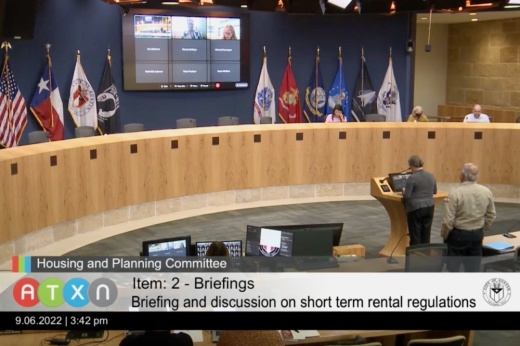Members of council's subcommittee on housing gathered Sept. 6 for a briefing on short-term rentals, or STRs, in Austin, and a discussion of the challenges the city faces when regulating those spaces and their visitors. While the Austin Code Department is responsible for some of that work, including complaints filed through the 311 system, staff said they typically face an uphill battle in their response.
Austin issues—and requires—licenses for three types of properties to operate as short-term rentals: owner-occupied and non-owner-occupied single-family homes and multifamily units regardless of occupancy status.
Nearly 2,000 STRs, many offered through companies such as Airbnb or Vrbo, were licensed citywide as of this summer. Just over two-thirds are owner-occupied residential homes, while more than 27% were in multifamily spaces. However, the number of unlicensed short-term rentals is estimated to be somewhere between four and six times more than Austin's licensed total; around 9,700 STR listings were active online as of Sept. 6. Conflict has surrounded STRs in Austin for years based on safety and nuisance concerns forwarded by neighbors near rentals and the city's regulation of the properties. Council had previously considered a moratorium on licensing new STRs, and both officials and staff pointed to the number of unlicensed rental homes across Austin as a persistent issue for the city to manage.
During his September briefing to council, code department Director José Roig said the vast majority of STR complaints the city receives stem from those thousands of unlicensed properties. And a combination of issues leave the city with limited options when responding to those concerns or identifying potential problem properties.
A primary challenge facing city code enforcement is finding homes that are operating without a license. Roig said rental advertisers have become "very savvy" when posting their properties on services such as Airbnb by limiting any identifying information such as an address or photos of the front of a house. And once a listing is taken down, code officers have no way to find it again.
“We have to become like kind of a detective trying to connect the house. Looking at photos, looking at Google Earth, trying to find that location so we can connect that advertisement to the house," he said.
Roig said the city also deals with a lack of cooperation or data-sharing from large rental companies. When any enforcement action is possible, it is often limited to a single home or unit.
“At this point, all the actions that I’m taking are against the property owner, not the hosting platforms, and we don’t have any cooperation from them," he said. "They basically hold the data. When you look at the advertisement, you cannot find the address; you cannot find the location, and that’s some of the things that we’re dealing with.”
Council members said they remain concerned about Austin's options with respect to the local STR market given the number of homes being used up by rentals and the frustrations of many neighbors living near what have become vacation party homes. Officials including Kathie Tovo—whose District 9 is home to the most STRs of any council district—also said Austin's licensing process and fees should be reviewed both to make sure enforcement is cost effective and that the relevant funds are collected from rental properties. According to the code department, the city expects to spend around $4.5 million on STR compliance and enforcement work in the next fiscal year.
“Every single day, the city is losing out on thousands of dollars that could go to support cultural arts, our music community and historic preservation projects," District 2 Council Member Vanessa Fuentes said. "I think it’s incumbent that our council revisits our STR conversation, to have a conversation on how we can work with the operators and work with our community to ensure that we have a system in place that everyone mutually benefits from.”
Another question facing the city is whether state lawmakers will strip away STR enforcement mechanisms from municipalities statewide. Legislative battles over rental regulations are nothing new, and despite past wins from the city's perspective, Intergovernmental Relations Officer Brie Franco told council that another fight on the topic is likely brewing ahead of the 2023 Texas legislative session.
After some STR legislation stalled out in 2017, 2019 and 2021, Franco said she believes bills aimed at allowing rental properties in any location and with "very minimal" enforcement options for cities could be on the table next year.
“So far we have been able to stop the legislation at the state level of preemption, but it is not without a lot of effort. And it is not just my office and our lobbying team, but all the homeowners ... coming forward and telling their stories to these members about the interference with their own use of their private property," Franco said.
Following the early September discussion, a meeting item centered on STRs was requested by City Council and could be scheduled in the near future.
"[There is] much more conversation we need to have about this," District 5 Council Member Ann Kitchen said.





